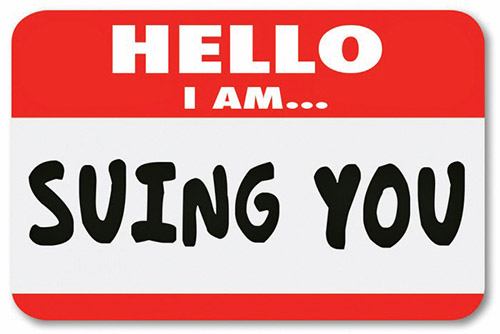
America—land of the free, home of the brave and headquarters of the frivolous lawsuit. We Americans will literally sue for anything and everything. Don’t believe me? Take Anton Purisima of Manhattan, for example. In 2014, he filed a lawsuit naming New York City, an Au Bon Pain bakery, two local hospitals, Kmart and a dog owner as the defendants. He sought damages for “civil rights violations, personal injury, discrimination on national origin, retaliation, harassment, fraud, attempted murder, intentional infliction of emotional distress and conspiracy to defraud.”
He pretty much included any instance in which he felt wronged by someone, including an infected finger he suffered when he was bitten by a dog on a bus and a “Chinese couple” taking unauthorized pictures of him at a hospital. He said no money in the world could satisfy him because his damages are priceless. So he decided on an amount of two undecillion dollars, which apparently is a two followed by 36 zeros. The problem with this is that this happens to be more money than there is on Earth. That means if he had won the lawsuit then presumably the global economy would collapse and we would all become indentured servants of Anton Purisima.
But this wasn’t even the worst lawsuit in recent years. In 2015, Jennifer Connell attended the eighth birthday party of her nephew, Sean Tarala. Apparently Tarala was so happy to see his beloved aunt that he leapt into her arms. The jump caused Connell to fall to the ground, breaking her wrist. So she did what every reasonable person would do and sued her 8-year-old nephew. She claimed her injuries were caused by Tarala’s “negligence and carelessness,” arguing that the 8-year-old birthday boy “should have known that a forceful greeting such as the one delivered by the defendant to the plaintiff could cause the harms and losses suffered by the plaintiff.”
This leads us to our question for today: What are the tax implications of winning a personal injury lawsuit? Would Anton Purisima have to pay taxes on his two-undecillion-dollar winnings?
General Rule for Personal Injury Awards
The general rule is that if you receive funds from a legal action or settlement that originates from physical injury or illness, then you don’t have to pay taxes on any of that income. This includes money received for pain and suffering, medical expenses, attorney’s fees and court costs and even lost wages.
However, the IRS ruled that you must pay taxes on any money awarded for emotional distress unless the emotional distress is attributable to a physical injury.
Exceptions
But there are exceptions to this rule, and you must pay taxes in the following four circumstances:
- Punitive damages. You must always include punitive damages as income, even if they are awarded due to physical injury or illness.
- Prior medical deductions. If a damage award reimburses a previously deducted medical expense, then you must include in income that amount, but only to the extent you received a tax benefit from the deduction in the tax year you claimed the deduction.
- Compensation for a voluntary act. If you receive a payment for pain and suffering from the voluntary performance of a contract, you can’t exclude that income.
- Interest. Interest paid on an award, even if allocable to an excluded amount, is taxable.
By Daniel Magence, CPA, Esq.
Daniel Magence, CPA, Esq. is a principal at Pristine CPA Solutions, LLC (www.pristinecpa.com). Pristine CPA Solutions offers tax and accounting services to individuals and businesses of all sizes, whether it’s tax returns, bookkeeping, payroll services or personal income budgeting. He can be reached at [email protected] or 201-326-6908 if you have any questions or comments, or are interested in using Pristine CPA’s services. Feel free to contact us for a free consultation.













